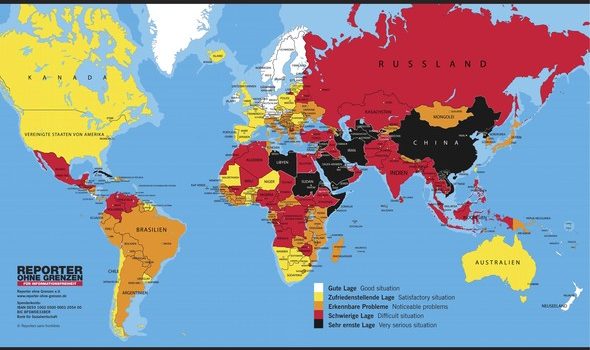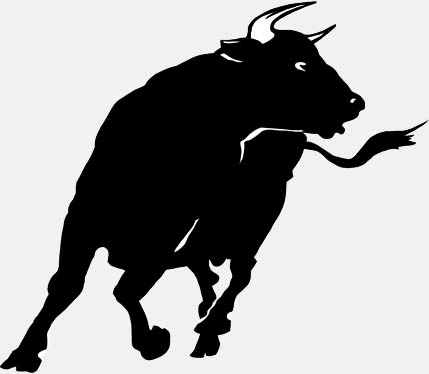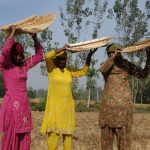
The post photo’s of Reporters Without Borders. The Berlin-based and international non-governmental organization lobbies worldwide for press freedom and against censorship. The parent organization, Reporters sans frontières RSF, was founded in 1985 in southern France, Montpellier, by four French journalists. Citing Article 19 of the Universal Declaration of Human Rights (right to freedom of opinion and freedom of expression), the organization is engaged among others, for imprisoned journalists, held by political reasons. This is increasingly more explosive, because what is already a democracy without the possibility of free expression of one’s opinion?
The ROG recently released a Press Freedom Index 2016 which raises questions, as in all regions of the world, a decline of freedom was identified last year. Increasingly autocratic tendencies in countries like Egypt, Russia or Turkey wore this trend also in how the armed conflicts as in Libya, Burundi and Yemen. Negative seem also the efforts of the governments act out in countries such as Poland and Hungary, bringing public and private media under their grip.
“Many leaders react paranoid to legitimate criticism by independent journalists,” said Reporters Without Borders CEO Michael Rediske. Among the threats to the independent reporting includes media hostile, often religiously tinted ideologies and repressive security laws. Many countries have enacted laws that allow journalists about can be sent to prison for allegedly insulting President, blasphemy or support of terrorist groups. another danger would of oligarchs, the media want to exploit in their possession for their political or economic purposes.
GERMANY has deteriorated in this year’s ranking by four Places down to the 16th – a consequence of the sharp rise in number of hostility, threats and violent attacks against journalists.
The Press Freedom Index 2016 compares the situation of journalists and media in 180 countries and territories. Examines the calendar year was substantially 2015. Fundamentals of rankings are a questionnaire on all aspects of independent journalism and the values determined by ROG numbers of assaults, violence and prison sentences against journalists. This results in each country point values that determine the ranking in the ranking in relation to the values of other countries. Depending on the performance of other countries, a country can therefore move up in each individual case in the rankings, although its score has deteriorated.
Important climbers and losers
Biggest losers in the ranking 2016 TAJIKISTAN (Course 150, -34) and BRUNEI (155, -34). In Tajikistan, President Emomali Rahmon makes under the pretext of combating terrorism silence critics. In Brunei increasing self-censorship in the face of the gradual introduction of sharia and a Blasphemieverbots. POLAND plunged 29 places to 47 from a series of targeted efforts of the new government to limit the independence of the public media and private media ≥repolonisieren “.
Biggest movers is TUNISIA (96, +30), which despite all the continuing deficits the fruits of media reforms start to harvest since upheaval of 2011th Violence and lawsuits against journalists are there still a problem, but decline in the trend. The UKRAINE (107) is due to significantly reduced previous violence 22 seats placed higher against journalists and overdue reforms, but continues to suffer from problems such as the overpowering role of oligarchs for the media landscape and the information war with Russia.
PRESS FREEDOM IN EUROPE
Last year, an investigation launched already in 2014 Erosion of European leading role in press freedom continued. Laws against terrorism and espionage were misused to restrict freedom of rights, passed laws for mass digital surveillance. Public and private media sometimes also came under increasing pressure.
A growing threat to journalistic independence goes out in some European countries by big business, not only catching more and more media, but also pursue other business interests. So in France (45, -7) now, most private media are of national importance a few entrepreneurs whose economic interests lie mainly in other sectors. In BULGARIA (113, -7) politicians and oligarchs control most of the media; also accepts violence against journalists.
Violence and hostility to death threats against journalists have increased in GERMANY (16, -4) in 2015 massively. Overall Reporters Without Borders counted at least 39 violent attacks against journalists particularly during demonstrations of Pegida movement and its regional subsidiary, at rallies of right-wing groups or counter-demonstrations. (More on the state of press freedom in this country in the UP GERMANY provided soon on the ROG’s website to download.)
Even in SWEDEN (8, -3), which is traditionally one of the countries with the most pronounced press freedom, sue on signs of stronger nationalist flow frightening many journalists over threats. Violence against journalists is also in Croatia (63, -5) and SERBIA (59, +8) an ongoing problem. In HUNGARY (67, -2) defines and monitors now a controlled by the government Media Council compliance with official decency “.
In TURKEY (151, -2) government and judiciary were not least massively dominated by the flared up again conflict with the Kurds against critical media before. Repeats messages barriers were imposed, invaded editorial offices or placed under state receivership, foreign reporters arrested and coated critical journalists with lawsuits. There were also assassinations of several Syrian media activist who fled to Turkey.
RUSSIA improved its rank (148, +4) only relative to the deterioration in his environment. Indeed, the persecution of critics has continued to increase there and shines now as a negative model to neighboring countries from. Most recently, for example, several foreign publishers were forced because of new restrictions its shares in Russian media for sale. Under increasing pressure are also non-governmental organizations committed to media freedom. Always undisguised Russia tried to influence the coverage abroad.
Nebulous dangers for the state to serve as a justification for ever harsher repression against the few remaining independent journalists in UZBEKISTAN (166, unchanged), KAZAKHSTAN (160, unchanged), AZERBAIJAN (163, -1) and BELARUS (157, unchanged), whose want to prevent regime protests due to the economic crisis and protests as 2013/2014 on the Kiev Maidan.
MIDDLE EAST AND NORTH AFRICA
In the Middle East and North Africa Journalists are many places in the terminal between the warring parties, extremely repressive governments and extremists who want to prevent any independent coverage. The worst in the region was the situation like in the past four years in SYRIA (177, unchanged), where journalists targeted and partly bestial violence are exposed. Extremism, tottering political orders and impunity for acts of violence make journalism in IRAQ (158, -2), in LIBYA (164, -10) and the YEMEN (170, -2) to a perilous profession.
In other countries in the region, although there is a formal peace, but in practice, especially the police state. In EGYPT (159, -1) as sitting more than 20 journalists because of their work in prison, many of them for two years or longer. Many are abused and tortured judged if at all in the absurd mass trials. ALGERIA (129, -10) its word with the closure of two TV stations, KUWAIT (103, -13) with the adoption of a dubious law against cybercrime.
Besides Tunisia are in the region of LEBANON (98, unchanged) and Israel (101, unchanged) the highest placed.
ASIA
In Asia, the situation in most countries has stagnated or deteriorated, including in democracies that previously were regarded as regional models. So engages in JAPAN (72, -11) since the adoption of a far-reaching secret Protection Act late 2014 increasingly self-censorship around. In SOUTH KOREA (70, -10), the government is increasingly intolerant of criticism and exacerbated the already strong polarization of the media. In HONG KONG (69, +1) acquisitions provide by businessmen from China increasing the independence of the media in question.
In CHINA (176, unchanged), the repression achieved under President Xi Jinping unimagined proportions. The regime shrinks neither abduction nor against forced confessions show on TV or in front of threats against families unwelcome journalists to enforce his absolute claim control over the media.
In MYANMAR (143, +1) now the boundaries of the opening rate are clearly visible, as well as to the PHILIPPINES (138, +3) the ineffectiveness of measures to better protect journalists. INDIA (133, +3) and BANGLADESH (144, +2) are in view of serious acts of violence against media workers remained largely idle. For journalists in SRI LANKA (141, +24) disappears after the end of the era of President Mahinda Rajapaksa, the fear of threatening phone calls or enforced disappearances.
AMERICA
In America, the press freedom attacks exposed from many sides: In COLOMBIA (134, -6), and large parts of Central America such as HONDURAS (137, -5) to make the activities of drug cartels and paramilitary groups investigative journalism perilous. Particularly frequent murders of journalists in MEXICO (149, -1); particularly greatly deteriorated, the situation in EL SALVADOR (58, -13) since the inauguration of President Salvador Sánchez Cerén, who has accused the media a ≥psychologische terror campaign “against him.
In the United States (41, +8) the greatest threats to freedom of the press by the digital monitoring as well as the legal government campaign against whistleblowers and investigative journalists go out. In VENEZUELA (139, -2) and ECUADOR (109, -1) is pressure from the authorities the greatest obstacle to independent journalism in BRAZIL (104, -5) corruption and ARGENTINA (54, +3) high media ownership concentration. CUBA remains relegated to the last places in the ranking (171, -2) in spite of the foreign policy thaw 2015 was to see no relaxation of extensive government control of the media there.
AFRICA
In Africa, the country with the strongest deterioration in the ranking of SOUTH SUDAN (140, -15). Time and again journalists there to victims of the ongoing civil war since 2013, as well as a campaign of intimidation by the government. Three days after threats by President Salva Kiir against journalists, a reporter was murdered outside his office last August; others fled abroad because they feared for their lives.
In BURUNDI (156, -11) journalists are exposed to every conceivable kind of repression, since President Pierre Nkurunziza announced his candidacy for a third term beginning, 2015. Private radio stations were forced to close with heavy weapons, arrested journalists arbitrarily and media prohibited. More than 100 journalists fled into exile, who remains in the country and criticized the president, risking arrest and torture.
In the CONGO (115, -8), UGANDA (102, -5) and DJIBOUTI (172, -2) responded the authorities with censorship, arrests, violence and threats against journalists to report on the activities of the opposition in advance of the respective elections in the spring 2016th
Increasing violence and a collapse of the state in parts of the country characterized the situation in NIGERIA (116, -5); Journalists are there threatened by the Islamist extremist group Boko Haram, but also of national security agencies. Also in MALI (122, -4), the situation deteriorated by the presence of jihadist groups; one of them threatened domestic and foreign journalists with beheading if they cooperate with foreign media.
TOP OF THE TABLE AND TAIL LIGHTS
The top positions of the rankings take a FINLAND, the NETHERLANDS and NORWAY. Contributing to about liberal rules on access to government information and the protection of journalists’ sources. At the end of the ranking keep unchanged ERITREA (180) NORTH KOREA (179) and TURKMENISTAN (178) dictatorships which control the media in their countries as well as completely. Eritrea can recently though sporadically foreign journalists to travel into the country, holding their local colleagues but caught part for nearly 15 years in deplorable conditions.
GLOBAL INDICATOR: PRESS FREEDOM WORLDWIDE ON THE RETREAT
In addition to the rankings of each country Reporters Without Borders calculated since 2013, an indicator of press freedom worldwide. This has made a clear decline in the freedom of the press, 2015. From the previous to the current ranking of the indicator has fallen by 3.7 percent since 2013 at 13.6 percent. The clearest (-16% since 2013) is the decline in the sub-indicator for the means of production of media: Some governments do not shy away from blockages of the Internet or the destruction of editorial offices, broadcasting equipment or printing presses in order to prevent unwanted reporting.
Clearly, the global decline also in the legal framework (-10% since 2013). This reflects the many laws again, ask the President insult, blasphemy or support for terrorism punishable and thus contribute in some countries to increasing self-censorship.
METHODOLOGY OF RANKING
The annual ranking of Reporters Without Borders assess the situation of the press and freedom of information in 180 countries. Basis of the ranking is a questionnaire on all aspects of independent journalism, the Reporters Without Borders in 20 languages Hundreds of journalists, researchers, jurists and human rights defenders worldwide and sent to its own network of correspondents. The current ranking is based on the year 2015 and for assaults, acts of violence and imprisonment in addition to the period from November until December 2014, which has not yet been considered in the previous ranking.
The total of 87 qualitative questions are divided into six categories: media pluralism, independence of the media, journalistic work environment and self-censorship, legal framework, institutional transparency and production infrastructure. From the weighted answers a score between 0 (best) to 100 (worst possible) is calculated. In addition, a quantitative category for assaults, acts of violence and imprisonment of journalists, the Reporters Without Borders identified according to established criteria themselves. It flows into a total score, from the results of the respective place in the ranking in relation to the results of the other countries. The score for assault can the rank of the country while only worsen, not improve.
The indicator of press freedom worldwide results from the average of a number of indicators for the various regions of the world. This in turn may each form the weighted population average of the scores of the respective States off Link: Reporters Without Borders
Tags: Press Freedom Index 2016











